ACLU Calls on Senate Judiciary Committee to Fully Probe Roberts' Record
FOR IMMEDIATE RELEASE
Contact: Media@dcaclu.org
WASHINGTON - As the Senate Judiciary Committee opened confirmation hearings for John Roberts, the nominee for Chief Justice of the United States Supreme Court, the American Civil Liberties Union today urged Senators to fully probe his record, legal and judicial philosophy, and his potential role on the court - the final protector of civil liberties.

John Roberts
BLOG
ACLU leaders discuss the confirmation hearings >>
ON THE RECORD
ACLU letter to the Senate on the nomination of John Roberts >>
ACLU report on John Roberts' record >>
RELATED NEWS
O'Connor Replacement Could Roll Back Liberties Protection >>
Summary of key rulings by Justice Sandra Day O'Connor >>
""There are many troubling spots in Roberts' incomplete record, and Senators must fulfill their constitutional obligation by asking the tough questions,"" said Anthony D. Romero, ACLU Executive Director, who attended the hearing today. ""The Supreme Court is the final arbiter on the important civil liberties and civil rights issues facing our nation, and this vacancy comes at a crucial time. Senators must act to ensure that the new chief justice will defend our freedoms.""
In a recent report, the ACLU analyzed the nominee's civil rights and civil liberties record, which remains incomplete due to a lack of full government disclosure of Roberts' work. But what is known about Roberts' record raises serious concerns about his commitment to affirmative action, upholding Roe v. Wade, the First Amendment, gender equality, habeas corpus and the ability of people to go to court to protect their rights.
While serving as the politically-appointed principal deputy solicitor general from 1989 to1993, Roberts authored briefs calling for Roe v. Wade to be overruled, supporting school prayer, and seeking to criminalize flag burning as a form of political protest. While the Supreme Court ruled against all of these positions, it remains closely divided on the underlying issues.
This summer, Roberts joined an opinion that the Geneva Conventions could not be enforced in American courts, reversing a lower court ruling invalidating the president's military commissions because they did not adequately protect the rights of Guantánamo detainees. Also, while working for the Reagan administration, Roberts repeatedly argued that Congress has the authority to strip the Supreme Court of its jurisdiction over important issues like busing, abortion, and school prayer.
However, Roberts also advised a gay rights advocate on how to argue an important case before the Supreme Court, successfully argued before the court in support of the Eighth Amendment rights of prisoners and advocated for the due process rights of welfare recipients.
""Serious questions must be asked to address the serious civil liberties concerns in Roberts' record,"" said Caroline Fredrickson, Director of the ACLU Washington Legislative Office. ""The Supreme Court must remain the tireless guardian of our liberties - and Senators must demand that Roberts will affirm that commitment.""
The report was prepared in accordance with ACLU policy, which requires a summary of each Supreme Court nominee for use by the Senate, the public and the media. The ACLU has opposed only two nominees: Justice William Rehnquist (in his initial nomination to the court) and Robert Bork.